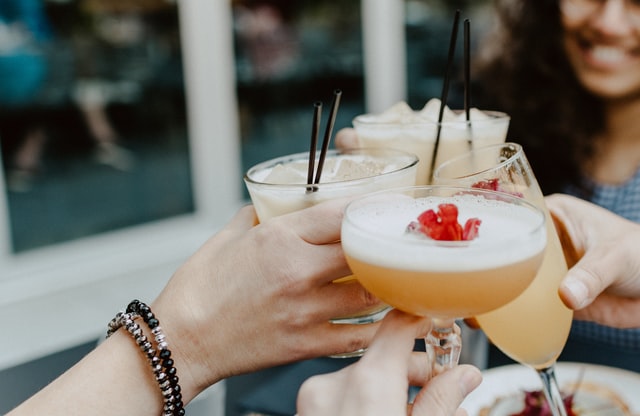Table of content
JOIN FREE GROUP
All About Recovery
Facebook Group • 2213 members
There's always clouds before the rainbows. Join many others who are going through the same thing as you and see proof that it can get better.
JOIN FREE GROUP Why is Alcohol Addictive?

Alcohol is everywhere — at social gatherings, sporting events, office parties, and people's homes. For many people, drinking can be simply a relaxing or fun experience. Unfortunately, however, it can also become very addictive — it's one of the most addictive substances, according to the National Institute on Alcohol Abuse and Alcoholism (NIAAA). Why is alcohol addictive? Why can some people stop after one or two drinks while others can't control their alcohol intake and develop a debilitating alcohol dependence? Learn about some of the factors that lead to alcohol addiction.  Image via Unsplash by kellysikkema Certain physical factors can make alcohol addictive. For starters, alcohol causes the brain to release chemicals known as endorphins and dopamine, which stimulate the brain's pleasure centres while also numbing its pain centres. These chemicals can make a person feel happy and content and not feel pain. A person may keep drinking to continue feeling good, and in this way, drinking can become addictive. Essentially, people are addicted to the way alcohol makes them feel and may experience cravings due to the effect that alcohol has on the brain. The release of endorphins and dopamine often accumulates in other areas of the brain, particularly the parts of the brain associated with addiction. While alcohol stimulates certain brain structures, it also tends to shut down the areas that control impulse control and decision-making abilities. People who might be sensible and cautious when sober may be much less so when drinking. They might take more risks or make poor decisions, including deciding to drink more when they've already had enough. As they continue drinking, they increase their chances of becoming addicted. Sometimes, alcohol can even change the brain's chemistry and how the brain works, according to the NIAAA. Unfortunately, alcohol abuse can become something of a vicious circle. The more a person drinks, the more the brain releases endorphins and dopamine. The more these chemicals get released, the happier and more satisfied people will feel when drinking. The more of a high they experience from the alcohol, the more they want to keep drinking heavily. This cycle makes addiction much more likely.
Image via Unsplash by kellysikkema Certain physical factors can make alcohol addictive. For starters, alcohol causes the brain to release chemicals known as endorphins and dopamine, which stimulate the brain's pleasure centres while also numbing its pain centres. These chemicals can make a person feel happy and content and not feel pain. A person may keep drinking to continue feeling good, and in this way, drinking can become addictive. Essentially, people are addicted to the way alcohol makes them feel and may experience cravings due to the effect that alcohol has on the brain. The release of endorphins and dopamine often accumulates in other areas of the brain, particularly the parts of the brain associated with addiction. While alcohol stimulates certain brain structures, it also tends to shut down the areas that control impulse control and decision-making abilities. People who might be sensible and cautious when sober may be much less so when drinking. They might take more risks or make poor decisions, including deciding to drink more when they've already had enough. As they continue drinking, they increase their chances of becoming addicted. Sometimes, alcohol can even change the brain's chemistry and how the brain works, according to the NIAAA. Unfortunately, alcohol abuse can become something of a vicious circle. The more a person drinks, the more the brain releases endorphins and dopamine. The more these chemicals get released, the happier and more satisfied people will feel when drinking. The more of a high they experience from the alcohol, the more they want to keep drinking heavily. This cycle makes addiction much more likely.
Table of contents 1. Physical Factors 2. Psychological Factors 3. Why Is Alcohol Addictive for Some People and Not Others?
Physical Factors
 Image via Unsplash by kellysikkema Certain physical factors can make alcohol addictive. For starters, alcohol causes the brain to release chemicals known as endorphins and dopamine, which stimulate the brain's pleasure centres while also numbing its pain centres. These chemicals can make a person feel happy and content and not feel pain. A person may keep drinking to continue feeling good, and in this way, drinking can become addictive. Essentially, people are addicted to the way alcohol makes them feel and may experience cravings due to the effect that alcohol has on the brain. The release of endorphins and dopamine often accumulates in other areas of the brain, particularly the parts of the brain associated with addiction. While alcohol stimulates certain brain structures, it also tends to shut down the areas that control impulse control and decision-making abilities. People who might be sensible and cautious when sober may be much less so when drinking. They might take more risks or make poor decisions, including deciding to drink more when they've already had enough. As they continue drinking, they increase their chances of becoming addicted. Sometimes, alcohol can even change the brain's chemistry and how the brain works, according to the NIAAA. Unfortunately, alcohol abuse can become something of a vicious circle. The more a person drinks, the more the brain releases endorphins and dopamine. The more these chemicals get released, the happier and more satisfied people will feel when drinking. The more of a high they experience from the alcohol, the more they want to keep drinking heavily. This cycle makes addiction much more likely.
Image via Unsplash by kellysikkema Certain physical factors can make alcohol addictive. For starters, alcohol causes the brain to release chemicals known as endorphins and dopamine, which stimulate the brain's pleasure centres while also numbing its pain centres. These chemicals can make a person feel happy and content and not feel pain. A person may keep drinking to continue feeling good, and in this way, drinking can become addictive. Essentially, people are addicted to the way alcohol makes them feel and may experience cravings due to the effect that alcohol has on the brain. The release of endorphins and dopamine often accumulates in other areas of the brain, particularly the parts of the brain associated with addiction. While alcohol stimulates certain brain structures, it also tends to shut down the areas that control impulse control and decision-making abilities. People who might be sensible and cautious when sober may be much less so when drinking. They might take more risks or make poor decisions, including deciding to drink more when they've already had enough. As they continue drinking, they increase their chances of becoming addicted. Sometimes, alcohol can even change the brain's chemistry and how the brain works, according to the NIAAA. Unfortunately, alcohol abuse can become something of a vicious circle. The more a person drinks, the more the brain releases endorphins and dopamine. The more these chemicals get released, the happier and more satisfied people will feel when drinking. The more of a high they experience from the alcohol, the more they want to keep drinking heavily. This cycle makes addiction much more likely. 



